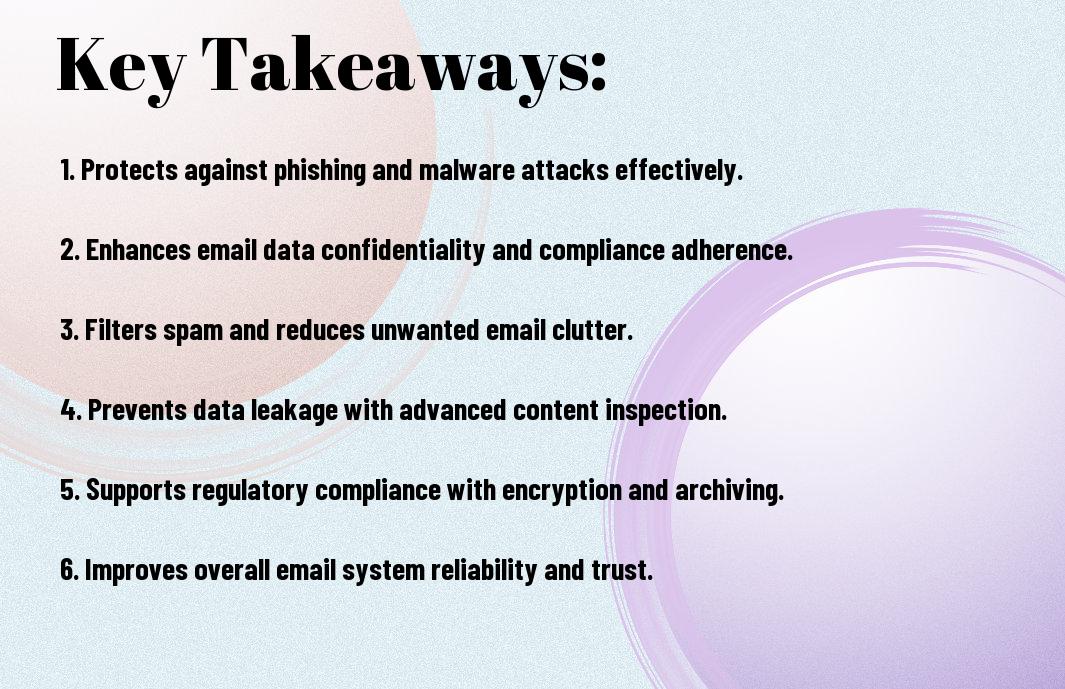There’s a growing concern among businesses about the security threats posed by email communication. As cyberattacks become more sophisticated, you need to protect your sensitive data and maintain your company’s reputation. Investing in a secure email gateway can provide you with enhanced protection against phishing, spam, and malware, ensuring that your communication channels remain safe. This proactive approach not only secures your data but also builds trust with your clients and partners, making it a vital consideration for any modern business strategy.
Key Takeaways:
- Enhances Security: A secure email gateway provides robust protection against phishing attacks, malware, and spam, helping businesses safeguard sensitive information.
- Compliance Assurance: Investing in a secure email gateway can help organizations meet regulatory requirements by ensuring that sensitive data is transmitted securely.
- Improved Productivity: By filtering out unwanted emails and threats, employees can focus on their work without distractions, leading to greater efficiency.
- Cost-Effective Solution: Preventing data breaches and downtime can save businesses significant costs in the long run, making a secure email gateway a wise investment.
- Real-Time Threat Intelligence: Many secure email gateways offer advanced analytics and reporting tools that provide insights into emerging threats, enabling proactive protection.

The Financial Rationale for Secure Email Gateways
The economic benefits of investing in a secure email gateway can significantly outweigh the initial costs. Businesses face mounting pressure from evolving cyber threats, and the financial implications of data breaches are staggering. According to recent studies, the average cost of a data breach can exceed $4 million, considering direct expenses and reputational damage. Therefore, allocating funds towards advanced security solutions not only mitigates these risks but also contributes positively to your bottom line.
Cost of Breaches Versus Investment in Security
Investing in a secure email gateway is a fraction of the costs associated with a potential data breach. With incidents often leading to hefty fines, legal fees, and remediation costs, the financial burden can quickly escalate. Organizations that prioritize cybersecurity find that even a minor investment in prevention can save them from significantly larger expenses down the line. A proactive approach can protect not just your assets but also your reputation and customer trust.
Long-term Savings through Operational Efficiency
Enhanced operational efficiency is a direct benefit of implementing a secure email gateway. By automatically filtering out spam, phishing, and malware, these systems streamline communication processes, reduce the time employees spend dealing with security incidents, and ultimately improve productivity. For example, a company experiencing high volumes of phishing attempts could see a substantial decrease in employee hours spent on security-related issues, translating to increased efficiency across departments.
Operational efficiency is more than just a buzzword; it translates to tangible time and cost savings for your business. By ensuring that your employees receive clean and secure emails, they can focus on core responsibilities rather than waste time sorting through potential threats. Moreover, the seamless integration of secure email gateways into existing workflows can reduce IT intervention, allowing your team to concentrate on strategic initiatives rather than constantly reacting to security breaches. Over time, these efficiencies can contribute to improved morale, lower employee turnover, and a stronger competitive edge in your industry.

The Evolving Threat Landscape
The threat landscape surrounding email communication is constantly shifting as cybercriminals develop increasingly sophisticated techniques to exploit vulnerabilities. With the rise of advanced phishing methods, ransomware, and other email-based threats, businesses face a myriad of challenges in keeping their sensitive information secure. Attackers are not only targeting large enterprises but are increasingly setting their sights on smaller companies, assuming that they hold fewer security measures in place. The need for robust email protection has never been more pressing for organizations of all sizes.
Statistics on Email-Based Attacks
Recent studies indicate that over 90% of cyberattacks begin with a phishing email, highlighting the significant role that email plays in cyber threats. In 2023 alone, organizations reported a staggering increase in email-borne malware incidents, making it clear that businesses cannot afford to underestimate the risks posed by insecure email systems. As attackers refine their tactics, organizations must recognize the importance of investing in a secure email gateway to safeguard against these pervasive threats.
Real-World Consequences of Inadequate Security
Inadequate email security can lead to devastating consequences for businesses, including data breaches, financial losses, and reputational damage. Companies have experienced compliance penalties due to failure in safeguarding sensitive customer information, resulting in both legal repercussions and a loss of trust. Organizations can find themselves embroiled in costly recovery efforts that might include rectifying unauthorized access, notifying affected parties, and even incurring litigation expenses as a result of negligence. The implications stretch beyond immediate financial loss; they can undermine customer confidence and disrupt business operations in the long run.
Consider the infamous Target breach of 2013, where inadequate email protections led to hackers gaining access to point-of-sale systems, resulting in the theft of over 40 million credit card accounts. The company faced more than $200 million in settlement costs, not to mention the significant damage to its reputation. As the threat landscape evolves, understanding these real-world consequences can drive home the necessity of investing in a secure email gateway. The protection it offers could very well be the difference between staying in business or facing an uphill battle to restore what was lost.

Unpacking the Technical Specifications
Understanding the technical specifications of secure email gateways provides insight into their critical functionality and overall efficacy when it comes to protecting your business communication systems. These specifications often encompass various features that contribute to enhanced security, efficiency, and adaptability, ensuring your business is well-equipped to handle emerging threats while maintaining smooth operations.
Key Features of Secure Email Gateways
The most effective secure email gateways offer a variety of robust features tailored to protecting your email communication. Key highlights include:
- Advanced threat detection and filtering
- Data loss prevention (DLP)
- Email encryption
- Spam and phishing protection
- Attachment scanning for malware
- Incident reporting and analytics
- Compliance with regulatory standards
- User-friendly management interfaces
Thou shalt ensure your chosen solution encompasses these features to fortify your email defenses comprehensively.
Integration with Existing Security Protocols
Seamless integration with existing security protocols is a hallmark of an effective secure email gateway. This compatibility enables you to reinforce current security layers without overhauling your infrastructure. Many secure email gateways are designed to work in harmony with existing tools, such as firewalls, intrusion detection systems, and endpoint protection solutions. By leveraging these integrations, you can ensure a more comprehensive defense strategy, enhancing your organization’s resilience against sophisticated cyber threats. Such synergistic capacity not only streamlines your security operations but also allows for more efficient monitoring and response to potential incidents, safeguarding your email communications in real time.
Enhancing Brand Reputation and Trust
Investing in a secure email gateway not only safeguards your data but also bolsters your brand’s reputation. With the rising number of data breaches, customers have become increasingly aware of security protocols. By prioritizing email security, you convey to clients and partners that protecting sensitive information is a top priority, fostering a sense of trust in your brand.
Impact of Security on Customer Perception
Your brand’s reputation can be profoundly impacted by how seriously you take email security. A single data breach can erode trust within a matter of hours, leading customers to question the integrity of your operations. Conversely, demonstrating strong security measures through your email service reassures clients, translating to better perception and confidence in your business.
Building Customer Loyalty through Proactive Measures
Proactively investing in a secure email gateway demonstrates your commitment to customer safety, which can significantly enhance customer loyalty. When clients see that you’re dedicated to protecting their information, they’re more likely to develop a long-lasting relationship with your brand. This proactive stance prevents security incidents from tarnishing trust and encourages clients to choose your business over competitors.
Establishing a secure email environment goes beyond mere compliance; it showcases your brand as a responsible and trustworthy entity in a crowded marketplace. Organizations that actively communicate their security measures often see a marked increase in client retention, with studies indicating that 86% of consumers are more likely to stay loyal to a brand they believe prioritizes their security. By integrating these proactive security strategies, you not only mitigate risks but create a loyal customer base that appreciates your vigilance in keeping their data safe.
The Future of Business Communication
The evolution of business communication is rapidly advancing, with email remaining a fundamental tool for interaction. As remote and hybrid work models become more prevalent, the reliance on secure and efficient communication channels is expected to increase. Companies are now prioritizing technologies that enhance collaboration while ensuring that the integrity of their communications is maintained. The future will likely see a stronger focus on integrated solutions that combine email security with productivity tools, creating a streamlined experience that meets both security and operational needs.
Trends in Email Security Technology
Emerging trends in email security technology highlight the shift towards artificial intelligence and machine learning, which enhance threat detection and response capabilities. Advanced filter systems are becoming standard, enabling businesses to identify phishing attempts and other malicious activities with greater precision. Additionally, solutions are incorporating automated orchestration to streamline incident response, further protecting your organization from sophisticated attacks. Cloud-based services are also on the rise, providing flexible and scalable security options suitable for any business size.
Preparing for the Next Wave of Cyber Threats
As cyber threats continue to evolve, preparing for the next wave is important for any business that values its operational integrity. With the rise of ransomware and increasingly sophisticated phishing schemes, adopting proactive measures becomes a priority. Implementing comprehensive email security frameworks, including advanced threat detection, employee training, and simulated phishing exercises, can significantly reduce your vulnerability. Additionally, ensuring that your systems are updated regularly and conducting routine security audits will further fortify your defenses against emerging threats.
To wrap up
Taking this into account, investing in a secure email gateway is crucial for safeguarding your business communications. With the rise of cyber threats, it is imperative to protect your sensitive information and maintain your reputation. By implementing a reliable email gateway, you enhance your security posture and ensure compliance with regulations. For more information on the importance of this investment, check out Why You Need A Secure Email Gateway For Your Business. Secure your business today to ensure its success tomorrow.
FAQ
Q: What is a Secure Email Gateway and why is it important for businesses?
A: A Secure Email Gateway (SEG) is a security solution that acts as a barrier between an organization’s email server and incoming/outgoing traffic. It filters and monitors emails to protect against threats such as phishing, malware, and spam. For businesses, investing in an SEG is important as it ensures the integrity of communications, protects sensitive information, and helps maintain the organization’s reputation by preventing security breaches.
Q: How does a Secure Email Gateway enhance compliance with data protection regulations?
A: Securing email communications is imperative for compliance with various data protection regulations like GDPR, HIPAA, and others. A Secure Email Gateway can help by encrypting messages, ensuring that only authorized recipients can access sensitive data. Additionally, it can provide features such as archiving and monitoring for audits, thereby helping businesses demonstrate compliance and avoid potential fines associated with data breaches.
Q: What cost savings can businesses expect by implementing a Secure Email Gateway?
A: Investing in a Secure Email Gateway can lead to significant cost savings by reducing the risk of data breaches, which can be very expensive due to legal fees, regulatory fines, and loss of customer trust. Additionally, many SEG solutions offer advanced features that can streamline email management and reduce the time spent on manual security tasks, allowing employees to focus on more productive activities. This efficiency can ultimately lower operational costs.
Q: Can a Secure Email Gateway integrate with existing security systems?
A: Yes, most Secure Email Gateways are designed to seamlessly integrate with existing security systems, such as firewalls, endpoint protection solutions, and security information and event management (SIEM) systems. This integration enhances overall security posture by allowing for better visibility and control over threats, ensuring that businesses can maintain a holistic security strategy without overhauling their entire IT infrastructure.
Q: What features should businesses look for when choosing a Secure Email Gateway?
A: When dicking out a Secure Email Gateway, businesses should look for features such as advanced threat protection (ATP), phishing detection, data loss prevention (DLP), encryption capabilities, and user-friendly management interfaces. Additionally, consider scalability options, reporting and analytics functionalities, and support for mobile devices to ensure that the chosen solution can adapt to the company’s growing needs and provide comprehensive email security.

